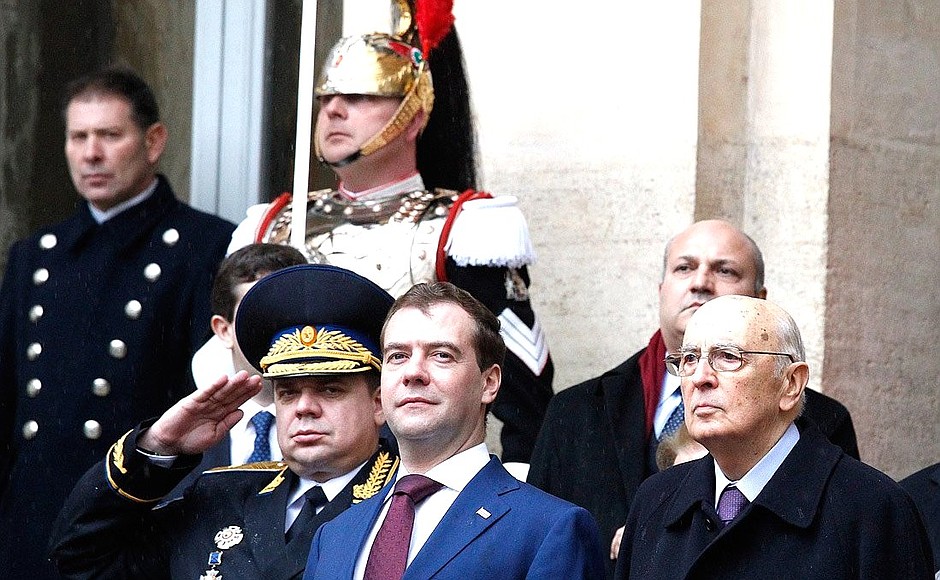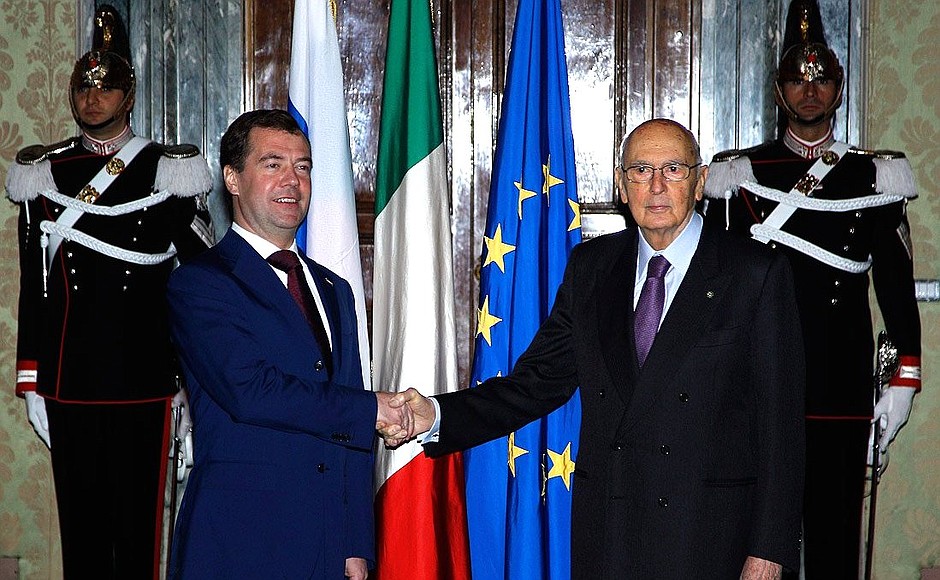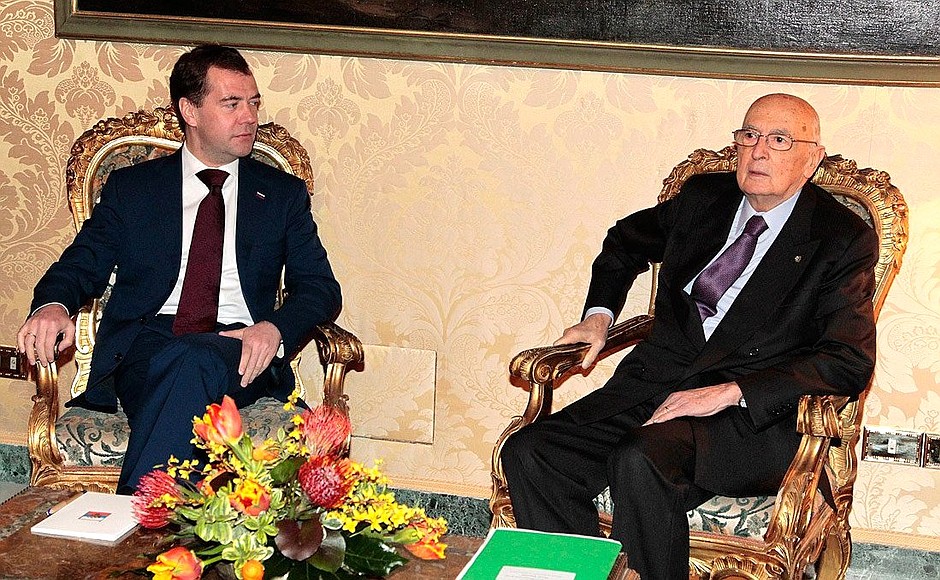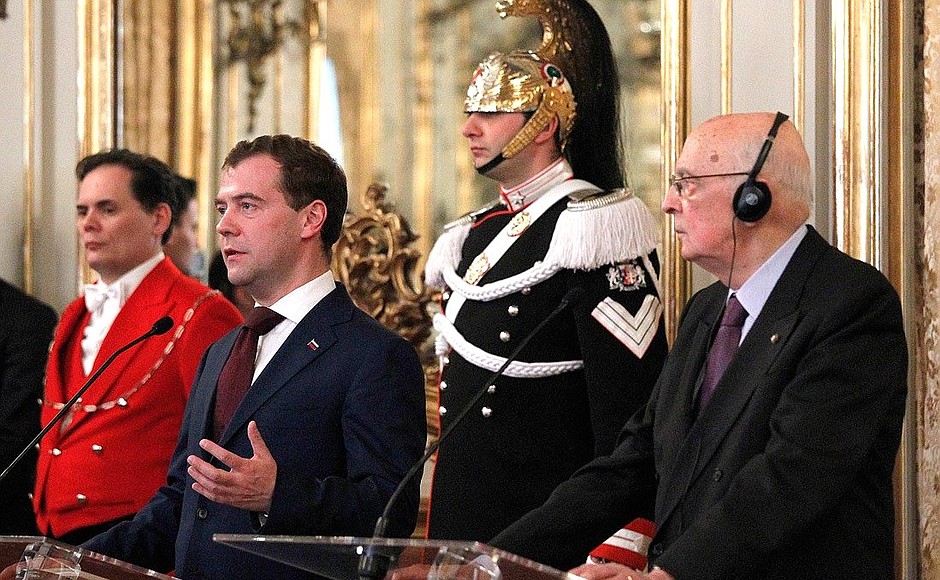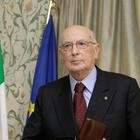The Presidents gave special attention to cooperation in the humanitarian sector and to cultural cooperation between Russia and Italy, particularly the upcoming Year of Russian Culture and Language in Italy and Year of Italian Culture and Language in Russia, which will include over 500 planned events.
Another topic during the talks was bilateral cooperation in security, gas and nuclear energy, and the financial sector.
In addition, the sides exchanged views regarding current issues on the international agenda such as global security and the situation in North Africa and in the Middle East.
Following the talks, Dmitry Medvedev and Giorgio Napolitano made press statements.
Press statements following Russian-Italian talks
President of the Italian Republic Giorgio Napolitano (retranslated): Good afternoon, everyone,
It was my great pleasure to meet with the President of the Russian Federation, Mr Medvedev, in an ever-stronger spirit of friendship.
First, he and I finalised the programme for the Year of Russian Culture and Language in Italy, which will formally open today. This programme will include a rich variety of very interesting events, covering a range of areas. We perceive the development of cultural relations to be an extremely important aspect for expanding economic, diplomatic, and all other relations between our countries.
Further today there will be meetings with the Government of Italy and we will oversee the signing of documents and important agreements concerning energy resources security and financial relations between our nations.
We recognise that these issues of prime importance – including for international cooperation – go beyond our bilateral relations. And here, we are referring to the issues that will be discussed at the next G20 summit in Paris where we will channel our attention and utmost efforts toward overcoming the situation resulting from the global financial crisis that erupted throughout our planet in 2008.
We also exchanged views on the role of cooperation between the Russian Federation and Europe, as well as between Russia and NATO. We talked about the NATO-Russia summit, which was held last month and which became a significant new move forward in the succession of step-by-step implementation of a transparent common anti-missile defence programme.
As for Europe and the hardships that have affected the euro, I expressed my opinion and certainty that euro gains are inevitable and that Europe will not take any steps backward with regard to the euro. It can and must only take steps forward on the path toward integration – toward a more integrated, united Europe that can play an important role on the global arena and which needs maximum cooperation with the Russian Federation, because the challenges and threats ahead of us in many areas, concerning many matters, are common.
We also discussed recent events on the international arena focusing on Tunisia, Egypt, and the overall picture we are seeing today in Northern Africa, which is also influencing the Middle East. We want to find joint solutions to these problems as well.
We believe that many nations should follow the path declared by President Medvedev with regard to the Russian Federation, the path of modernisation and rule of law. Modernising economy, ensuring its consolidated growth, improving social fairness while respecting personal rights – all these are key aspects in overcoming or anticipating and preventing the tensions we are observing in certain countries today.
Finally, during my conversation with President Medvedev, I was delighted to advise him that several days ago, the Cabinet and I signed a document on extending invitations to 68 heads of state and government to take part in celebrating the 150th anniversary of Italy’s reunification. This celebration will take place on June 2 in Rome and I have invited heads of state to attend it. It coincides with our national holiday, Republic Day.
I very much hope that President Medvedev will accept my invitation and find time in his schedule to spend a day participating in our celebration devoted to this important event. It would be a very important step, allowing us to further strengthen cooperation and friendship between our two countries.
Thank you, Mr President.
President of Russia Dmitry Medvedev: Colleagues, ladies and gentlemen,
President Napolitano in his opening remarks spoke about practically everything we have been dealing with. He gave a very accurate and detailed report, which simplifies my task of course, though I would be happy to go once more over the subjects we discussed and the main positions we expressed.
What did President Napolitano and I talk about? We noted that relations between Russia and Italy are not just very important in themselves, but are strategic for the European Union as a whole and its individual members to build a solid foundation for their ties with Russia. Italian businesspeople are very active in coming to our country, and our trade ties have increased substantially last year, as we both noted, and this is a sign that, first, European countries are emerging from the crisis, and second, mutual interest in developing joint business remains high.
Three important documents will be signed soon, and the President and I both agree that these three documents reflect the diversity of our cooperation, while at the same time showing the main outlines for work together.
What are these three documents? I will anticipate events a little here. First of all, there is our security cooperation and the document in this area on military transit to and from Afghanistan. This is without question one of the important areas in which Russia is working together with all of the European countries, and now Italy is joining in this cooperation with us too on the basis of a separate agreement.
Second, there is our energy sector cooperation, which also serves as a foundation for developing cooperation in other sectors too. In this respect we have some decent results. We would like to continue developing our ties in trading gas and other energy sources, and in the nuclear energy sector. This is also one of the symbols of our cooperation.
Finally, cooperation in the financial sector is also important, especially at a time when countries are emerging from the crisis period. President Napolitano said just before that the last few years were very difficult for the European Union. This applies equally to other countries as well. We are very pleased that the European Union found the strength to bolster its policies and adopt a consolidated line, helping the countries that ran into difficulties and preserving the euro as a common currency. As I have said in the past, I think that having the euro as one of the global reserve currencies has helped other countries too, which do not use the euro as a means of payment, to overcome the crisis and its consequences, and is an important part of the global efforts to fight financial problems.
We exchanged views on how we view post-crisis development. We spoke about what needs to be done to make the next G20 summit, which will take place in France, a success, and ensure that its decisions are transformed into concrete action.
We talked about global security, and also about the chain of events that are still unfolding in the Middle East and Africa. These are complex problems of course. Our position is that the conflicts taking place there and the events that are unfolding must all be resolved on the basis of these countries’ own laws and in respect for their constitutions and the basic rights and freedoms enshrined in their legal systems.
We also discussed our work in an area it gives us great pleasure to develop, namely, the Year of Russian Culture and Language in Italy, and the Year of Italian Culture and Language in Russia. This is a big project that encompasses more than 500 events, some of which have already begun, with others still to come. I hope that many Italians will be able to visit the exhibitions and concerts that will take place in Italy, and that Russians will take part in the events that Italy will organize in our country. This is certainly a very positive event and a good area of work.
I note that this is not just about culture but also about promoting the study of our respective languages. I read the memos available and saw that around 30,000 people in Italy are studying Russian, and around 40,000 people in Russia are studying Italian. This is maybe not such a big number, but it is not a small number either. I hope that these events will encourage more people to study Russian and Italian.
The last thing that the President mentioned was an anniversary date coming up in Italy. I want to thank the President for his invitation to take part in celebrating the 150th anniversary of Italy’s reunification. I think this will be an excellent event. In any case, to judge by the faces of the journalists in the press pool accompanying the Russian president, our people welcome this event with great interest. It will certainly be of interest to all who love and appreciate Italy, and there are a great many such people in our country.
Once more, I want to thank President Napolitano for the invitation.
